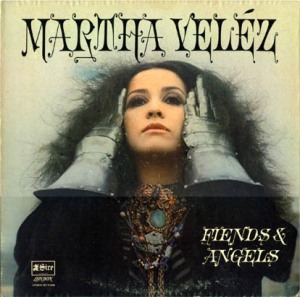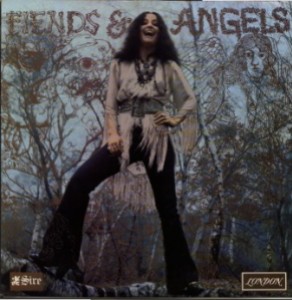For years, the album Fiends & Angels has been one of the best kept secrets from the late 1960s blues-rock scene. Finally in 2008, the independent CD label Wounded Bird, which specializes in albums that the majors refuse to reissue, released this Martha Velez gem.
 Until then, it had fetched rather pricey numbers on auction sites despite not having been a big seller at the time of its release in 1968. Still it was one of the defining blues-rock albums of the times, bringing together an almost perfect combination of singer, players and producer for a raw blues outing with unbridled energy. And some of the best playing by some of England’s best musicians.
Until then, it had fetched rather pricey numbers on auction sites despite not having been a big seller at the time of its release in 1968. Still it was one of the defining blues-rock albums of the times, bringing together an almost perfect combination of singer, players and producer for a raw blues outing with unbridled energy. And some of the best playing by some of England’s best musicians.
Not available in the album credits and still not known completely, the personnel included, Eric Clapton, guitar; Jack Bruce (Cream), bass; Mitch Mitchell (Jimi Hendrix) and Jim Capaldi (Traffic), drums; Brian Auger (Oblivion Express), organ; Christine McVie (Chicken Shack, later Fleetwood Mac), piano; Keef Hartley, drums, and Chris Mercer, sax (Keef Hartley Band, John Mayall); Chris Wood (Traffic), sax and flute; and Duster Bennett, harmonica. That’s just a portion of the list.
Velez is a New Yorker, who studied opera at a young age and later attended the High School for the Performing Arts in Manhattan. She also joined a touring folk group, the Gaslight Singers, in college (Long Island University) and later had several lead roles on Broadway, including Hair. So how did she wind up recording her first solo album in England with all these prominent blues-rock musicians?
While recording a demo in New York with producer Richard Gottehrer, Seymour Stein of Sire Records was in the studio by coincidence. They immediately wanted to sign Velez and when it was revealed she loved the blues and particularly the material Cream was doing, they hooked her up with Mike Vernon, an English blues producer who had worked with the early Fleetwood Mac, John Mayall and later Ten Years After, among many others. He was also the founder of the blues label, Blue Horizon.
Vernon gathered together the elite group of musicians and a torrent of hot, inspired performances was unleashed on the material, matched perfectly to Velez’s voice, which has a trained quality but can be raunchy when needed.
 The guitar solos are ferocious on most cuts and although Clapton is said to have played on only four, he is extremely recognizable on the heavy groove of Lightnin’ Hopkins’ Feel So Bad, I’m Gonna Leave You (perhaps the album’s best two tracks), It Takes A Lot To Laugh, It Takes A Train To Cry and In My Girlish Days. This was confirmed on a Velez compilation, Angels Of The Future Past, released on CD in the late ’80s. The other solos are just as powerful and inventive, perhaps attributable to the only listed guitarist on the session, Rick Hayward, although Spit James (Keef Hartley) and Paul Kossoff (Free) are said to have also participated.
The guitar solos are ferocious on most cuts and although Clapton is said to have played on only four, he is extremely recognizable on the heavy groove of Lightnin’ Hopkins’ Feel So Bad, I’m Gonna Leave You (perhaps the album’s best two tracks), It Takes A Lot To Laugh, It Takes A Train To Cry and In My Girlish Days. This was confirmed on a Velez compilation, Angels Of The Future Past, released on CD in the late ’80s. The other solos are just as powerful and inventive, perhaps attributable to the only listed guitarist on the session, Rick Hayward, although Spit James (Keef Hartley) and Paul Kossoff (Free) are said to have also participated.
Jack Bruce is equally recognizable for his driving bass lines, all tight, punchy and restrained. Bennett blows heavy duty harp on both I’m Gonna Leave You and Feel So Bad, and Vernon also made liberal use of horns, giving the sessions yet another dimension.
The album contains so many other jewels: Velez’s funky composition Swamp Man, which holds the album’s title in the lyrics; the Joplin-esque slow blues A Fool For You; a cover of Etta James’ Tell Mama; the moderate shuffle of a smouldering Drive Me Daddy, over which Velez wails; Come Here Sweet Man, a delicate Velez original; and Let The Good Times Roll, the suitable rollicking closer. A great selection of songs.
Velez went on to record four other albums in the ’70s, including a reggae release, Escape To Babylon, produced by Bob Marley. She never fully returned to an album of all blues, although she did work with Vernon one more time on Matinee Weepers. Married to Keith Johnson, noted trumpet player with the Paul Butterfield Blues Band and Van Morrison, she also sang with Morrison’s band for a while. All her records, with the exception of her second, Hypnotized, are available from Wounded Bird.
You are unlikely to find Wounded Bird releases in a big music or electronics store at the mall. They are readily available at places such as Amazon. But a trip to the label’s web site is preferred because perusing its catalogue, you’ll find so many other long lost albums that haven’t seen the light of day on a major label.
My vinyl version of Fiends & Angels is still one of my most treasured from that time period. Even one in funky condition is fetching as much as $50 on eBay, despite the CD release. You have to love that album cover, too. The second image is from the UK release. For the record, Velez’s full name is Martha Carmen Josephine Hernandéz Rosario de Veléz. That’s an earful and so is this classic album.

 Until then, it had fetched rather pricey numbers on auction sites despite not having been a big seller at the time of its release in 1968. Still it was one of the defining blues-rock albums of the times, bringing together an almost perfect combination of singer, players and producer for a raw blues outing with unbridled energy. And some of the best playing by some of England’s best musicians.
Until then, it had fetched rather pricey numbers on auction sites despite not having been a big seller at the time of its release in 1968. Still it was one of the defining blues-rock albums of the times, bringing together an almost perfect combination of singer, players and producer for a raw blues outing with unbridled energy. And some of the best playing by some of England’s best musicians. The guitar solos are ferocious on most cuts and although Clapton is said to have played on only four, he is extremely recognizable on the heavy groove of Lightnin’ Hopkins’ Feel So Bad, I’m Gonna Leave You (perhaps the album’s best two tracks), It Takes A Lot To Laugh, It Takes A Train To Cry and In My Girlish Days. This was confirmed on a Velez compilation, Angels Of The Future Past, released on CD in the late ’80s. The other solos are just as powerful and inventive, perhaps attributable to the only listed guitarist on the session, Rick Hayward, although Spit James (Keef Hartley) and Paul Kossoff (Free) are said to have also participated.
The guitar solos are ferocious on most cuts and although Clapton is said to have played on only four, he is extremely recognizable on the heavy groove of Lightnin’ Hopkins’ Feel So Bad, I’m Gonna Leave You (perhaps the album’s best two tracks), It Takes A Lot To Laugh, It Takes A Train To Cry and In My Girlish Days. This was confirmed on a Velez compilation, Angels Of The Future Past, released on CD in the late ’80s. The other solos are just as powerful and inventive, perhaps attributable to the only listed guitarist on the session, Rick Hayward, although Spit James (Keef Hartley) and Paul Kossoff (Free) are said to have also participated.